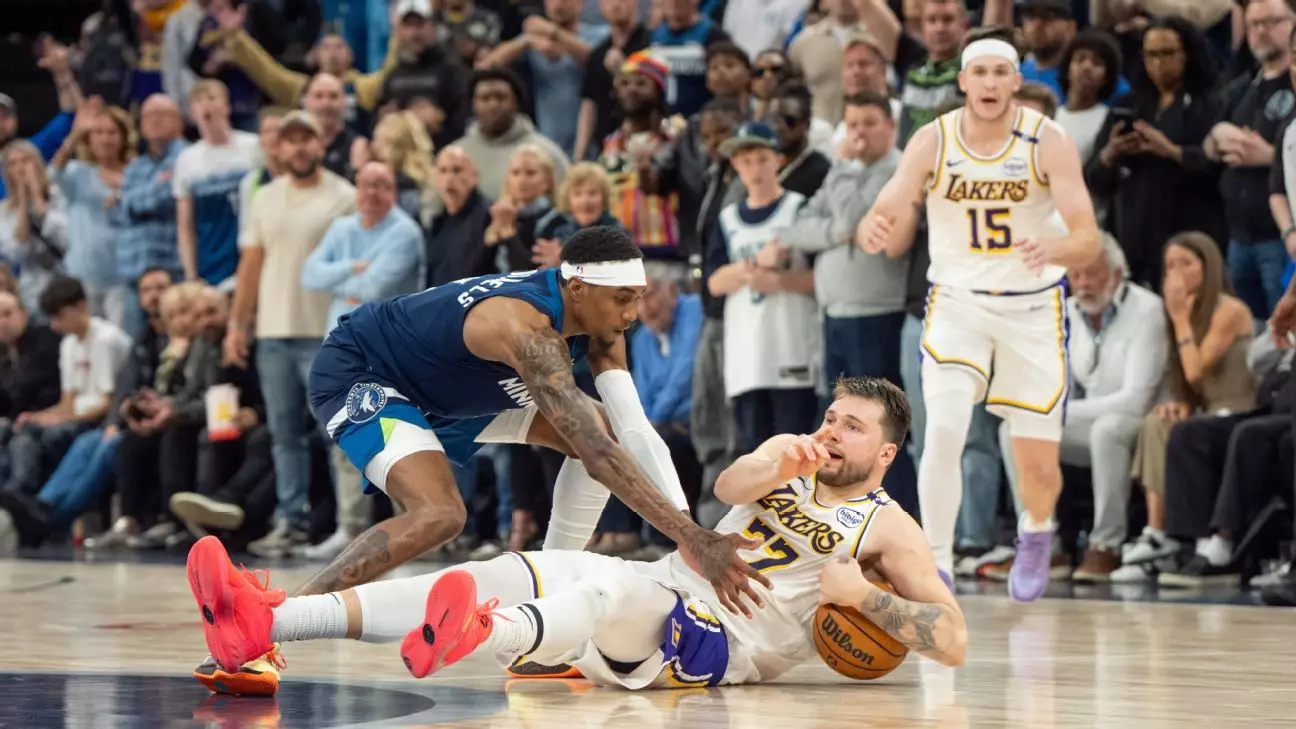In the realm of basketball, especially within the high-stakes environment of the NBA playoffs, every decision — from a player’s shot selection to a referee’s whistle — can significantly influence the outcome of a game. The recent encounter between the Los Angeles Lakers and the Minnesota Timberwolves showcased this reality grimly, as crucial missed calls from referees left fans and players fuming. Such errors can morph into pivotal moments in playoff series, shaping perceptions and altering trajectories for teams vying for championship glory.
Missed Opportunities and High Tensions
With just 33 seconds remaining in Game 4, the Lakers found themselves trailing by a single point. Luka Doncic, proving to be his team’s backbone, was clearly fouled by Minnesota’s Jaden McDaniels near midcourt, yet the referees’ whistles remained silent. The NBA’s subsequent acknowledgment of this oversight brought frustration bubbling to the surface, particularly for Doncic, who plainly stated, “I got tripped, for sure.” The refusal to award a foul not only deprived the Lakers of a potential scoring chance but also shifted the momentum entirely. Instead of setting up for a possible game-changing free throw, the Lakers were left scrambling for an alternative play.
This incident mirrored a separate pivotal moment in the Eastern Conference matchup, where New York’s Josh Hart was fouled but was denied free throws as the clock ticked down. These instances of negligence from officials not only reshape individual games but also carry implications for the perception of fairness within the league as a whole.
Critical Decisions Under Pressure
The mechanics of officiating during choppy playoff games raise questions about consistency and bias. Even more troubling is the all-too-common scenario where players like LeBron James, who himself has been a lightning rod for calls over his storied career, feel the weight of these decisions. James asserted that hand contact should be part of the game’s natural flow, but that sentiment still stings when viewed through the lens of critical moments. The irony is palpable; James understood a foul was called against him in a crucial juncture but felt that the hand indeed should be considered as part of play when the ball is at stake.
While examining these deeply contentious calls, it’s time we rethink the role of officiating in pivotal playoff circumstances. The game’s intensity is amplified, and with that elevation comes the necessity for officials to be at their sharpest. Spectators expect a standard of excellence; without it, the integrity of the game is questioned, breeding discontent among teams and their fervent supporters.
Analyzing Impact Beyond the Court
The ultimate effects of missed calls extend beyond mere scoreboard discrepancies; they signify a broader malaise within the league’s officiating processes and spark ongoing debates about accountability. Fan loyalty can wane amidst perceived injustices, and narrative arcs concerning potential championships can pivot abruptly due to an unwavering commitment to preserving the immediacy of the game over meticulous adjudication. This persistent challenge signifies a quest not just for fairness but for fostering an environment where the players’ talents can shine unencumbered by the flaws of the officiating crew.
As the playoff series advance, both the Lakers and the Timberwolves head into future clashes with the memory of these missed opportunities looming large. Reflecting upon these moments provides a vital lesson on the weight of every decision made within those thirty-two minutes of action on the court, emphasizing the unbreakable link between player performance and game management.

